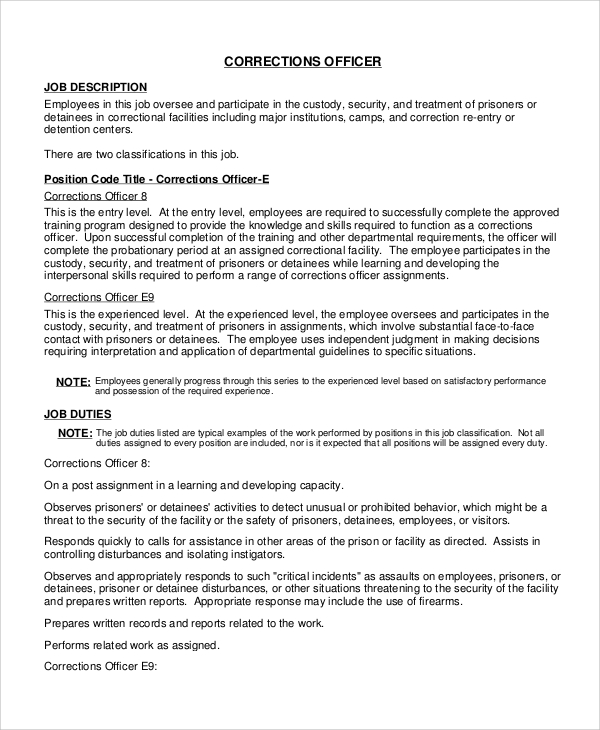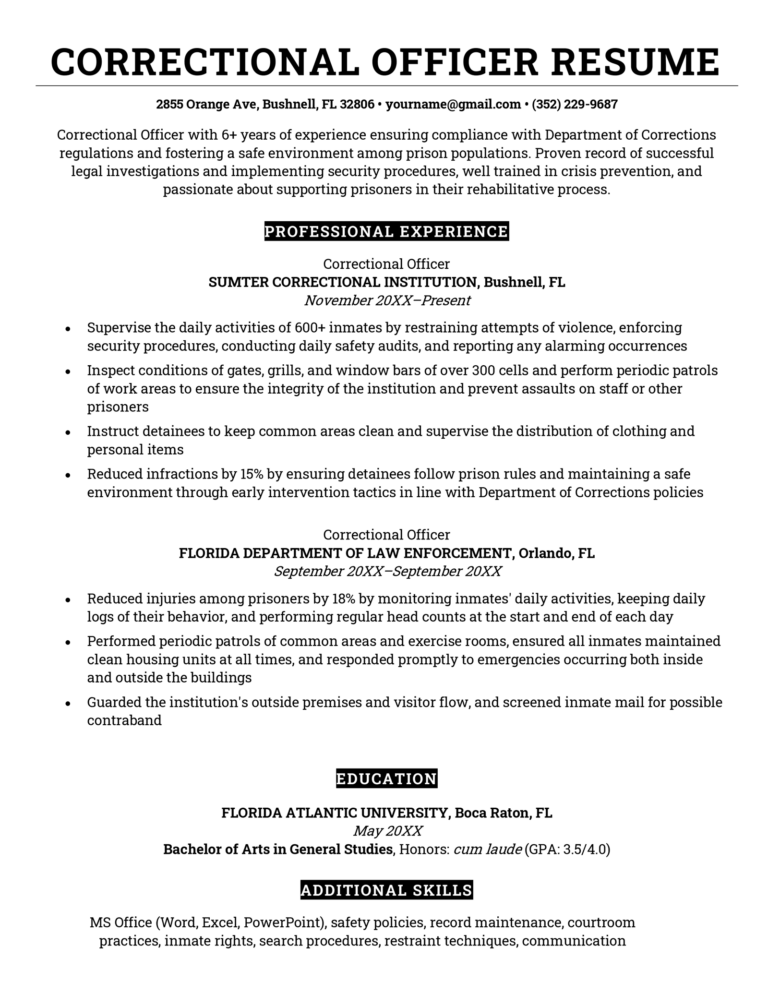Imagine yourself standing guard at the front gate of a correctional facility, responsible for the safety and security of both those within its walls and those beyond. You’re not just a guard; you’re a peacekeeper, a mediator, and a watchful presence – a correctional officer. The job demands a unique blend of strength, compassion, and unwavering dedication. But how do you showcase these qualities on your resume, making it stand out from a stack of others hoping to join the ranks?

Image: www.sampletemplates.com
This article is your guide to crafting a compelling correctional officer resume. We’ll delve into the key responsibilities, explore the most sought-after skills, and reveal tips for crafting a document that captures attention and lands you an interview.
Understanding the Scope: Correctional Officer Duties and Responsibilities
The role of a correctional officer is far from a straightforward “guard” position. It encompasses a multifaceted set of duties and responsibilities aimed at maintaining order and security within the correctional facility. Here’s a glimpse at the core aspects of the job:
Security and Supervision
- Maintaining Order and Security: This involves enforcing rules and regulations, responding to incidents, and ensuring the safety of inmates and staff.
- Conducting Searches: Correctional officers may conduct searches of inmates, their cells, and facility areas to prevent contraband and maintain safety.
- Monitoring Inmates: This involves constant observation of inmates to prevent escapes, riots, or other dangerous acts.
- Escorting Inmates: Correctional officers escort inmates to various locations within the facility for meals, medical treatment, or visits.
Communication and Documentation
- Reporting Incidents: Correctional officers are responsible for documenting all incidents, including inmate behavior, suspicious activities, and security breaches.
- Communication with Staff and Inmates: Effective communication is vital. Correctional officers must interact with inmates, staff, and other professionals, explaining rules and procedures while maintaining a professional demeanor.
- Maintaining Logs and Records: Accurate record-keeping is crucial for tracking inmate activities, facility operations, and security measures.

Image: resumegenius.com
Rehabilitation and Support
- Promoting Positive Behavior: Correctional officers play a crucial role in fostering positive behavior among inmates. They may supervise inmate work programs, encourage participation in educational or vocational activities, and offer guidance and support.
- Conflict Resolution: Correctional officers often act as mediators during disagreements or conflicts between inmates. They use their communication and problem-solving skills to de-escalate situations and prevent violence.
- Assisting with Programs and Services: Correctional officers may also assist with programs designed to rehabilitate inmates, such as substance abuse treatment, mental health counseling, or job training.
These responsibilities highlight the diverse nature of a correctional officer’s role. While security remains paramount, there’s a growing emphasis on rehabilitation and fostering a positive environment within the facility.
Crafting a Winning Correctional Officer Resume: Skills and Keywords
Landing a correctional officer position requires more than just a strong work ethic and a willingness to serve. Your resume must showcase specific skills and experience relevant to the job. Here are the key skills and keywords to highlight:
Essential Skills for a Correctional Officer Resume
- Security and Safety: This includes experience in implementing security measures, conducting searches, and maintaining order.
- Communication Skills: Correctional officers need to be able to communicate effectively, both verbally and in writing, with inmates, staff, and other professionals.
- Observation skills: Attention to detail and the ability to detect potential threats are critical for maintaining safety.
- Conflict Resolution and De-escalation: Skills in managing conflicts, de-escalating tense situations, and negotiating are highly sought-after.
- Problem-Solving and Decision-Making: Correctional officers often face unexpected challenges and need to make quick, sound decisions.
- Physical Fitness: Correctional officers must be physically fit to perform their duties, which may involve physical restraint or other demanding tasks.
- Teamwork and Collaboration: Working effectively as part of a team is essential in a correctional environment.
- Integrity and Ethical Conduct: High ethical standards and a commitment to upholding the law are paramount in this profession.
Tailoring Your Resume for Specific Roles
While some skills are universal, tailoring your resume to specific job postings is crucial. For example, if a posting emphasizes experience with inmate rehabilitation programs, highlight your involvement in such programs, the specific skills you gained, and any positive outcomes achieved.
Quantifying Your Experience
To make your resume truly stand out, go beyond simply listing skills and responsibilities. Use numbers and specific examples to quantify your achievements. For example, instead of saying “Experienced in security protocols,” write “Implemented security protocols that reduced inmate-on-inmate incidents by 20%.”
Building a Strong Resume Foundation
Now that you’ve identified the key skills for your resume, let’s focus on the core structure and content. Here’s a comprehensive guide to building a winning correctional officer resume:
1. Contact Information: Keep It Professional
- Full Name: Include your full name, making sure it matches your job application.
- Phone Number: Provide a reliable phone number where you can easily be reached.
- Email Address: Use a professional email address (e.g., yourname@email.com). Avoid using informal or personal email accounts.
- LinkedIn Profile (Optional): If you have a LinkedIn profile, consider including the URL under your contact information.
2. Summary/Objective: Catch the Reader’s Eye
- Summary (For Experienced Candidates): Briefly summarize your qualifications, highlighting your most relevant skills and experience.
- Objective (For Entry-Level Candidates): State your career goal and explain what you hope to achieve in this role.
- Keep It Concise: Aim for 3-4 sentences maximum.
3. Work Experience: Showcasing Your Accomplishments
- Reverse Chronological Order: List your work experience starting with your most recent position.
- Include Relevant Details: For each position, provide the job title, company name, location, and dates of employment.
- Action Verbs: Use strong action verbs (e.g., supervised, implemented, managed, developed) to describe your accomplishments.
- Quantify Your Achievements: Use numbers and specific examples to illustrate the impact of your work.
- Tailor to the Job Description: Highlight the skills and experience most relevant to the correctional officer position you’re applying for.
4. Education: Showcase Your Qualifications
- Degree and Institution: List your highest completed degree (e.g., associate’s degree, bachelor’s degree, high school diploma) along with the name of the institution.
- Relevant Courses: If you have taken any courses related to criminal justice, security, or corrections, list them in a separate section.
- Certifications and Licenses: Highlight any relevant certifications or licenses you hold, such as a POST certificate or first aid certification.
5. Skills: A Comprehensive List
- Soft Skills: Include skills like communication, problem-solving, conflict resolution, teamwork, and leadership.
- Hard Skills: List specific technical skills like security protocols, search and seizure procedures, and inmate supervision.
- Keyword Alignment: Use keywords from the job description to ensure your skills match the employer’s requirements.
6. Additional Information (Optional): Showcasing Your Commitment
- Volunteer Work: If you have experience working in a community service setting, it can demonstrate your commitment to helping others.
- Language Proficiency: If you are fluent in multiple languages, include this information, as it can be a valuable asset in a diverse correctional environment.
- Awards and Recognition: Highlight any awards, achievements, or recognition you have received, especially those related to your professional development.
7. References: Providing Proof of Your Worth
- “Available upon Request”: Include a statement at the end of your resume saying “References are available upon request.”
- Prepare Your References: Contact your references beforehand and inform them that you’re applying for jobs.
Finalizing Your Resume: Perfection and Presentation
Your correctional officer resume is almost ready to go! Here are a few final touches to ensure it’s polished and professional:
- Proofread Carefully: Make sure there are no typos, grammatical errors, or inconsistencies in your resume.
- Use a Professional Font: Choose a clean and easy-to-read font like Arial, Calibri, or Times New Roman.
- Consistent Formatting: Maintain consistent formatting throughout your resume, using headings, bullet points, and spacing effectively.
- Save as PDF: Save your resume as a PDF document to ensure that the formatting remains consistent across different computers and devices.
Correctional Officer Duties And Responsibilities Resume
Beyond the Resume: Building Your Professional Presence
Remember, your resume is just one piece of the puzzle. Building a strong professional presence can significantly improve your chances of landing an interview. Here are some tips:
- Network: Attend career fairs, reach out to correctional professionals on LinkedIn, and build connections in your field.
- Volunteer: Gain relevant experience by volunteering with organizations involved in criminal justice or community service.
- Enhance Your Skills: Consider pursuing additional training or certifications to enhance your knowledge and skills.
- Stay Informed: Stay updated on the latest developments and trends in corrections by reading industry publications and attending conferences.
By following these guidelines, you can create a compelling correctional officer resume that showcases your skills, experience, and dedication to a challenging yet rewarding profession. Remember, your resume is your first impression; make it count!






